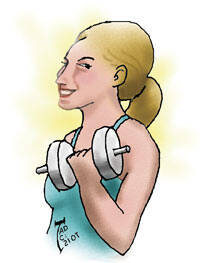Spiritual Training
Jesus often does not give straight answers to questions posed to him. Today’s Gospel story, for instance, starts with someone asking him, “Will only a few people be saved?” It seems like a straightforward question about numbers. But Jesus perceives that the questioner and the others whom he was teaching were not really as concerned about the final headcount as they were about whether they themselves would be included among the redeemed.
The first part of Jesus’ answer is about what you must do to position yourself for admission into the final gathering of the saved. The person who asked the question rightly recognized that salvation is God’s work. The passive voice of the verb “be saved” implies that one does not save oneself; the redeeming action is done by God. However, as Jesus’ response makes clear, one must engage in rigorous training in order to be in condition to accept the gift of being saved.
Jesus advises that one must “strive to enter the narrow gate.” The verb agonizomai, “strive,” is used to describe what is required in athletic training (similarly, see 1 Cor 9:25). Just as an athlete must gradually build up strength through daily disciplined exercise, so spiritual fitness takes consistent effort and training. Jesus notes that many who attempt to enter will not be strong enough. The second reading from Hebrews also focuses on the discipline necessary to build up spiritual strength. Five times the author uses words derived from the Greek paideuo and paideia, which have to do with “discipline.” The primary meaning is “instruction, training for responsible living.”
The author makes an analogy between the training a child receives from a parent and the guidance God provides us for deepening in the spiritual life. The Greek noun here means not so much punishment for wrongdoing as training for life. Some discipline consists in self-imposed, chosen actions that strengthen the spirit and enable one to follow the path of faithfulness. Other modes of life-shaping experiences are not purposely chosen, but how we deal with them forms us spiritually.
The author of Hebrews focuses on the latter kind of formation. He speaks of how God, like a loving parent, can help us learn from the difficulties that befall us and can guide us in how to become stronger through them. In the author’s worldview everything that happens, both for good and for ill, is caused by God, so the writer suggests that God imposes trials as discipline.
His analogy of God as a loving parent, however, leads us also to think of God as never purposely inflicting suffering on us. The end result is that our spiritual “gymnastic” efforts (the verb gymnazo in v. 11, is a term for athletic training) lead to peace, joy and right relation, with our drooping hands and weak knees healed and strengthened.
In the Gospel Jesus speaks about what can happen to those who do not put any effort into “working out” spiritually. When the final moment comes, they will be on the outside pleading to get in, thinking that just having been present where Jesus was teaching would be enough. It is like someone who goes to the gym but only watches other people train. Such a person is not considered a member of the company of athletes or prepared to make it to the finish line, the “narrow gate,” and it will be too late then to start training. Jesus returns to the original question and, echoing the first reading from Isaiah, envisions masses of people from all directions who will be included among those saved. We may be surprised by who gets there first.
This article also appeared in print, under the headline “Spiritual Training,” in the August 16, 2010, issue.








